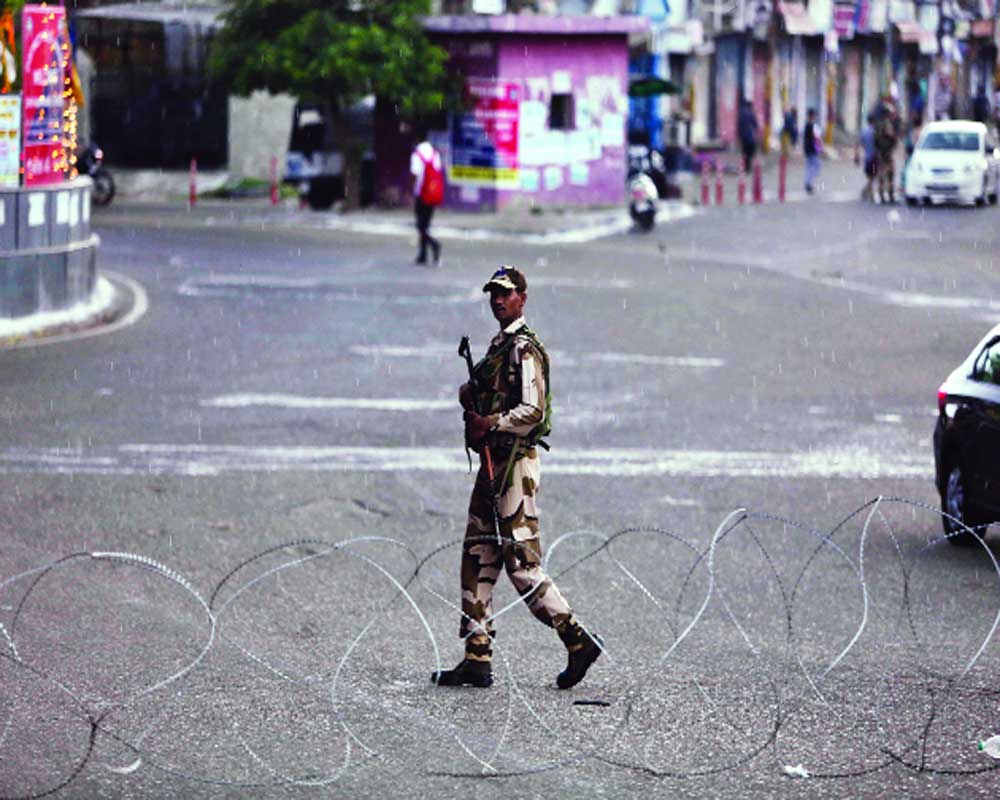Politically expedient, may be, but the effect Article 370 repeal will have on Kashmiris’ cultural identity could be devastating
Righting historical wrongs may sometimes be a desirable political objective but may not necessarily be prudent. In many cases, if settled issues are meddled with or, to put it colloquially, sleeping dogs are disturbed from slumber, consequences can be serious. Jammu and Kashmir seems headed in that unfortunate direction following Monday’s dramatic announcements revoking Article 370 and 35A along with the bifurcation of the erstwhile State, now reconstituted as two Union Territories, one with and the other without an elected Assembly. The insertion of Article 370 in the Constitution, granting Special Status to Jammu and Kashmir following its merger with India in the aftermath of the Partition in 1947, was in itself a flawed decision prompted by Jawaharlal Nehru’s soft corner for his ancestral homeland. For many years J&K stayed cut off completely from the rest of India, so much so that Indian nationals required a permit to cross the Tawi river. This resulted in Jana Sangh founder Syama Prasad Mukherjee’s forced entry, arrest by Sheikh Abdullah’s police and controversial death in custody. Other draconian provisions of the Article included the ban on non-State subjects from acquiring property and even daughters inheriting parental property if they married non-subjects of the State. In fact, many other progressive Central legislations, too, were not operational as every Indian law had to be ratified by the State Assembly. The existence of a separate State flag, a separate Constitution and the executive head of the State being designated Wazir-e-Azam (Prime Minister), were sore points with a vast majority of Indians resenting the “special favours” doled out by the Centre, including subsidised rations to the State’s residents. But the Centre, too, did little to bridge the alienation in India’s only Muslim-majority State. Most elections in the decades after the merger were widely perceived as rigged, in which electoral participation was abysmally low and Chief Ministers without a popular support base were regularly imposed and toppled at will. Gradually, New Delhi whittled down the State’s pre-1953 autonomy, giving fillip to separatist sentiment long before full-fledged Pakistan-sponsored terrorism erupted in 1989 following the abduction of Rubaiya, daughter of then Union Home Minister Mufti Mohammad Sayeed. Matters reached a point of no return after the ethnic cleansing of Kashmiri Pandits from the Valley, who had to live in abject misery elsewhere — refugees in their own land. With Pakistan routinely upping the ante by promoting both cross-border terrorism and supporting home-grown religious militancy, India’s patience was running thin.
Having said that, it must be emphasised that not all Kashmiris had turned hostile to India. The democratic political process was running effectively despite periodic hiccups and even voters’ participation in the three-tier electoral system was rising at every passing polls. The mainstream leaders of all parts of the State averred their faith in the Indian system, including its secular, democratic Constitution whose values are in sharp contrast to those extolled by pro-Pakistani separatists. The abrogation of Article 370 may have been a long-standing commitment of the ruling BJP but the effect it will have on Kashmiris’ perceived cultural identity could be devastating. Separatists are certain to hype up their slogan of the Indian Army being an “army of occupation” which has “colonised” the State. Few voices from the Valley are likely to back New Delhi’s move although residents of Ladakh seeking separation from the Valley for a long time are likely to welcome the bifurcation move. Apart from hard-core ultra-nationalists, many others in the rest of India may view the timing of the measure as political muscle-flexing in the face of severe reverses facing the economy. It will be alleged that the knee-jerk moves were propelled by the Union Government’s attempt to induce public amnesia to counter its pathetic failure to handle the economic downturn and the drastic loss of employment opportunities. The country is anticipated to face a bout of international criticism too for curbing democratic freedoms in the erstwhile State. The likely negative fallout of these measures on communal harmony in the country cannot be overlooked. Kashmir may have been Nehru’s blunder as the BJP claims. But undoing it 70 years later is not a sign of maturity, especially as it may spark widespread discontent and even greater alienation in the picturesque Kashmir Valley. No poet hereafter may write poignant lines such as:
Agar bar-ruyi zamin ast, u hamin ast, hamin ast, u hamin ast
(If there be a heaven on Earth, it is this, it is this, it is this)


























